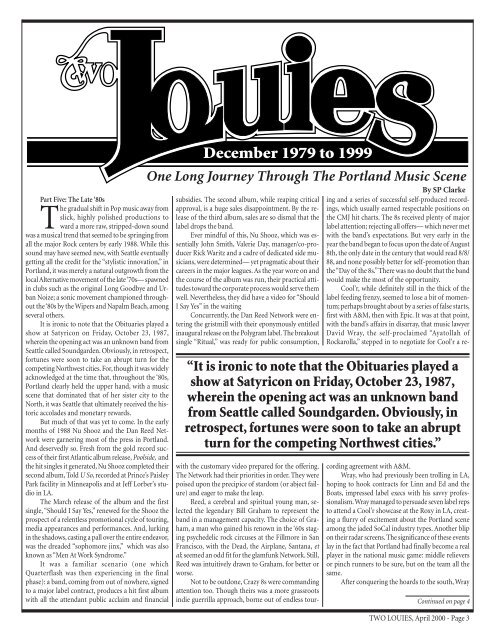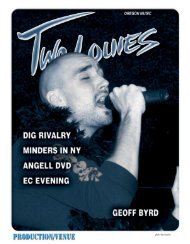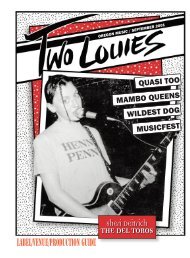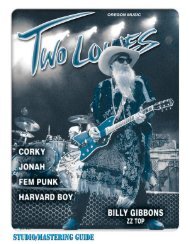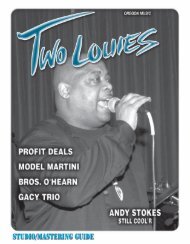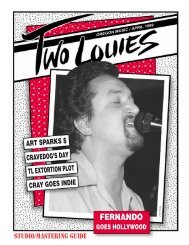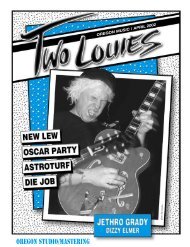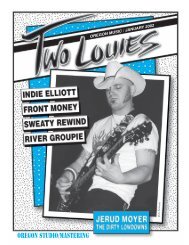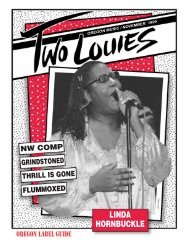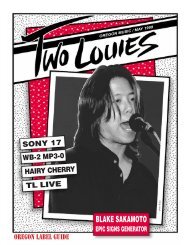2L April 00 Studio - Two Louies Magazine
2L April 00 Studio - Two Louies Magazine
2L April 00 Studio - Two Louies Magazine
Create successful ePaper yourself
Turn your PDF publications into a flip-book with our unique Google optimized e-Paper software.
Part Five: The Late ‘80s<br />
The gradual shift in Pop music away from<br />
slick, highly polished productions to<br />
ward a more raw, stripped-down sound<br />
was a musical trend that seemed to be springing from<br />
all the major Rock centers by early 1988. While this<br />
sound may have seemed new, with Seattle eventually<br />
getting all the credit for the “stylistic innovation,” in<br />
Portland, it was merely a natural outgrowth from the<br />
local Alternative movement of the late ‘70s— spawned<br />
in clubs such as the original Long Goodbye and Urban<br />
Noize; a sonic movement championed throughout<br />
the ‘80s by the Wipers and Napalm Beach, among<br />
several others.<br />
It is ironic to note that the Obituaries played a<br />
show at Satyricon on Friday, October 23, 1987,<br />
wherein the opening act was an unknown band from<br />
Seattle called Soundgarden. Obviously, in retrospect,<br />
fortunes were soon to take an abrupt turn for the<br />
competing Northwest cities. For, though it was widely<br />
acknowledged at the time that, throughout the ‘80s,<br />
Portland clearly held the upper hand, with a music<br />
scene that dominated that of her sister city to the<br />
North, it was Seattle that ultimately received the historic<br />
accolades and monetary rewards.<br />
But much of that was yet to come. In the early<br />
months of 1988 Nu Shooz and the Dan Reed Network<br />
were garnering most of the press in Portland.<br />
And deservedly so. Fresh from the gold record success<br />
of their first Atlantic album release, Poolside, and<br />
the hit singles it generated, Nu Shooz completed their<br />
second album, Told U So, recorded at Prince’s Paisley<br />
Park facility in Minneapolis and at Jeff Lorber’s studio<br />
in LA.<br />
The March release of the album and the first<br />
single, “Should I Say Yes,” renewed for the Shooz the<br />
prospect of a relentless promotional cycle of touring,<br />
media appearances and performances. And, lurking<br />
in the shadows, casting a pall over the entire endeavor,<br />
was the dreaded “sophomore jinx,” which was also<br />
known as “Men At Work Syndrome.”<br />
It was a familiar scenario (one which<br />
Quarterflash was then experiencing in the final<br />
phase): a band, coming from out of nowhere, signed<br />
to a major label contract, produces a hit first album<br />
with all the attendant public acclaim and financial<br />
December 1979 to 1999<br />
One Long Journey Through The Portland Music Scene<br />
subsidies. The second album, while reaping critical<br />
approval, is a huge sales disappointment. By the release<br />
of the third album, sales are so dismal that the<br />
label drops the band.<br />
Ever mindful of this, Nu Shooz, which was essentially<br />
John Smith, Valerie Day, manager/co-producer<br />
Rick Waritz and a cadre of dedicated side musicians,<br />
were determined— yet pragmatic about their<br />
careers in the major leagues. As the year wore on and<br />
the course of the album was run, their practical attitudes<br />
toward the corporate process would serve them<br />
well. Nevertheless, they did have a video for “Should<br />
I Say Yes” in the waiting<br />
Concurrently, the Dan Reed Network were entering<br />
the gristmill with their eponymously entitled<br />
inaugural release on the Polygram label. The breakout<br />
single “Ritual,” was ready for public consumption,<br />
with the customary video prepared for the offering.<br />
The Network had their priorities in order. They were<br />
poised upon the precipice of stardom (or abject failure)<br />
and eager to make the leap.<br />
Reed, a cerebral and spiritual young man, selected<br />
the legendary Bill Graham to represent the<br />
band in a management capacity. The choice of Graham,<br />
a man who gained his renown in the ‘60s staging<br />
psychedelic rock circuses at the Fillmore in San<br />
Francisco, with the Dead, the Airplane, Santana, et<br />
al; seemed an odd fit for the glamfunk Network. Still,<br />
Reed was intuitively drawn to Graham, for better or<br />
worse.<br />
Not to be outdone, Crazy 8s were commanding<br />
attention too. Though theirs was a more grassroots<br />
indie guerrilla approach, borne out of endless tour-<br />
By SP Clarke<br />
ing and a series of successful self-produced recordings,<br />
which usually earned respectable positions on<br />
the CMJ hit charts. The 8s received plenty of major<br />
label attention; rejecting all offers— which never met<br />
with the band’s expectations. But very early in the<br />
year the band began to focus upon the date of August<br />
8th, the only date in the century that would read 8/8/<br />
88, and none possibly better for self-promotion than<br />
the “Day of the 8s.” There was no doubt that the band<br />
would make the most of the opportunity.<br />
Cool’r, while definitely still in the thick of the<br />
label feeding frenzy, seemed to lose a bit of momentum;<br />
perhaps brought about by a series of false starts,<br />
first with A&M, then with Epic. It was at that point,<br />
with the band’s affairs in disarray, that music lawyer<br />
David Wray, the self-proclaimed “Ayatollah of<br />
Rockarolla,” stepped in to negotiate for Cool’r a re-<br />
“It is ironic to note that the Obituaries played a<br />
show at Satyricon on Friday, October 23, 1987,<br />
wherein the opening act was an unknown band<br />
from Seattle called Soundgarden. Obviously, in<br />
retrospect, fortunes were soon to take an abrupt<br />
turn for the competing Northwest cities.”<br />
cording agreement with A&M.<br />
Wray, who had previously been trolling in LA,<br />
hoping to hook contracts for Linn and Ed and the<br />
Boats, impressed label execs with his savvy professionalism.<br />
Wray managed to persuade seven label reps<br />
to attend a Cool’r showcase at the Roxy in LA, creating<br />
a flurry of excitement about the Portland scene<br />
among the jaded SoCal industry types. Another blip<br />
on their radar screens. The significance of these events<br />
lay in the fact that Portland had finally become a real<br />
player in the national music game: middle relievers<br />
or pinch runners to be sure, but on the team all the<br />
same.<br />
After conquering the hoards to the south, Wray<br />
Continued on page 4<br />
TWO LOUIES, <strong>April</strong> 2<strong>00</strong>0 - Page 3


